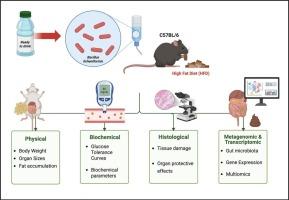基于地衣芽孢杆菌的功能性益生菌饮料调节肠道微生物群和宿主转录组,以抵消高脂肪饮食小鼠模型中的肥胖
IF 4
2区 农林科学
Q2 FOOD SCIENCE & TECHNOLOGY
引用次数: 0
摘要
肥胖的特征是肠道菌群失调、全身性炎症和多器官功能障碍。本研究评估了一种以地衣芽孢杆菌为基础的益生菌饮料在高脂肪饮食(HFD)诱导的肥胖小鼠中的作用。雄性C57BL/6小鼠接受标准饮食或HFD,添加或不添加益生菌,为期21周。益生菌处理的HFD小鼠表现出显著减少体重增加、内脏脂肪、肝脂肪变性、肾损伤和脾造血应激。葡萄糖耐量改善,血清胆固醇降低。肠道菌群分析显示α-多样性增加,厚壁菌门/拟杆菌门比例部分恢复,短链脂肪酸生成类群富集。肝脏转录组学显示干扰素和抗原递呈通路下调,参与组织再生和脂质代谢的基因上调。这些生理、微生物和转录组学的综合变化表明,地衣芽孢杆菌益生菌饮料对hfd诱导的损伤具有系统性保护作用。我们的研究结果支持其作为一种非乳制品功能干预的潜力,可以调节肠道器官轴并恢复致肥饮食中的代谢平衡。本文章由计算机程序翻译,如有差异,请以英文原文为准。

Functional Bacillus licheniformis-based probiotic beverage modulates gut microbiota and host transcriptome to counteract obesity in a high-fat diet mouse model
Obesity is characterized by gut microbiota dysbiosis, systemic inflammation, and multi-organ dysfunction. This study evaluated a Bacillus licheniformis-based probiotic beverage in high-fat diet (HFD)-induced obese mice. Male C57BL/6 mice received standard diet or HFD, with or without probiotic supplementation, for 21 weeks. Probiotic-treated HFD mice exhibited significantly reduced weight gain, visceral fat, hepatic steatosis, renal injury, and splenic hematopoietic stress. Glucose tolerance improved, and serum cholesterol decreased. Gut microbiota analysis revealed increased α-diversity, partial restoration of the Firmicutes/Bacteroidetes ratio, and enrichment of short-chain fatty acid-producing taxa. Liver transcriptomics showed downregulation of interferon and antigen presentation pathways, and upregulation of genes involved in tissue regeneration and lipid metabolism. These integrated physiological, microbial, and transcriptomic changes suggest systemic protection by Bacillus licheniformis probiotic beverage against HFD-induced damage. Our findings support its potential as a non-dairy functional intervention to modulate the gut–organ axis and restore metabolic balance in obesogenic diets.
求助全文
通过发布文献求助,成功后即可免费获取论文全文。
去求助
来源期刊

Journal of Functional Foods
FOOD SCIENCE & TECHNOLOGY-
CiteScore
9.60
自引率
1.80%
发文量
428
审稿时长
76 days
期刊介绍:
Journal of Functional Foods continues with the same aims and scope, editorial team, submission system and rigorous peer review. We give authors the possibility to publish their top-quality papers in a well-established leading journal in the food and nutrition fields. The Journal will keep its rigorous criteria to screen high impact research addressing relevant scientific topics and performed by sound methodologies.
The Journal of Functional Foods aims to bring together the results of fundamental and applied research into healthy foods and biologically active food ingredients.
The Journal is centered in the specific area at the boundaries among food technology, nutrition and health welcoming papers having a good interdisciplinary approach. The Journal will cover the fields of plant bioactives; dietary fibre, probiotics; functional lipids; bioactive peptides; vitamins, minerals and botanicals and other dietary supplements. Nutritional and technological aspects related to the development of functional foods and beverages are of core interest to the journal. Experimental works dealing with food digestion, bioavailability of food bioactives and on the mechanisms by which foods and their components are able to modulate physiological parameters connected with disease prevention are of particular interest as well as those dealing with personalized nutrition and nutritional needs in pathological subjects.
 求助内容:
求助内容: 应助结果提醒方式:
应助结果提醒方式:


